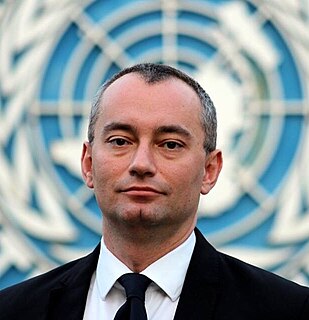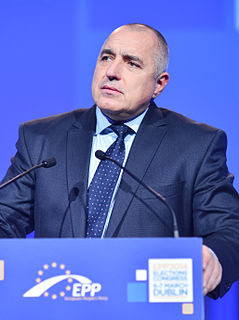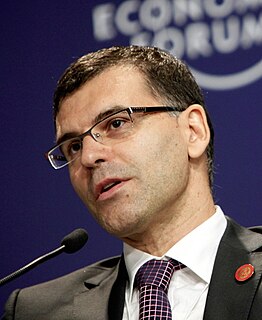
The politics of Bulgaria take place in a framework of a parliamentary representative democratic republic, whereby the Prime minister is the head of government, and of a multi-party system. Executive power is exercised by the government. Legislative power is vested in both the government and the National Assembly. The Judiciary is independent of the executive and the legislature.

The Bulgarian Socialist Party, known as the Centenarian, is a social-democratic political party in Bulgaria and the successor to the Bulgarian Communist Party. It is a member of the Party of European Socialists with a pro-EU stance, although it has taken some euroskeptic positions and called for an end to EU sanctions against Russia. BSP is also a member of the Socialist International. It is Bulgaria's largest political party by membership.

Bulgaria elected its members of the European Parliament in a by-election on 20 May 2007. It was the country's first European election, having joined the Union on 1 January of that year. The country still had 18 MEPs, no change from before the election. Until Bulgaria could hold these elections, the country was represented by MEPs appointed by the National Assembly.

Tsvetan Genchev Tsvetanov is a Bulgarian politician and former government official. A former security deputy mayor of Sofia, he was, until 2009, the chairman of the GERB party. On 8 July 2009, in the wake of the 2009 parliamentary election won by his party, he was specified by de facto party leader Boyko Borisov as future Minister of the Interior.

Tsetska Tsacheva Dangovska is a Bulgarian jurist and GERB politician who is the current Minister of Justice of Bulgaria as part of the Third Borisov Government, having assumed office on 4 May 2017. She had previously held the position of Chairwoman of the National Assembly of Bulgaria on two occasions. Tsetska Tsacheva is the first woman to ever chair the National Assembly of Bulgaria since its establishment in 1878.

Parliamentary elections were held in Bulgaria on 12 May 2013, two months ahead of schedule. Protests had forced the resignation of the GERB government in February, leading to the election being moved up.

The European Parliament election of 2014 in Bulgaria was held on 25 May 2014 to elect the Members of the European Parliament from Bulgaria to the European Parliament as part of the larger European Parliament election. After a decision by the European Council in 2013, Bulgaria was allocated 17 seats in the European Parliament for the Eighth European Parliament.
The Oresharski Government was the eighty-ninth cabinet of Bulgaria which took office on 29 May 2013. The government, led by Prime Minister Plamen Oresharski, is one of technocrats created following the 2013 election. The cabinet was dissolved on 6 August 2014 to make way for a caretaker government that would lead Bulgaria through early elections in October of the same year.

The eighty-seventh Cabinet of Bulgaria was a minority government chaired by Boyko Borisov. The government was formed after Borisov's party, GERB, won the 2009 parliamentary election. It remained in power relying on support from the opposition parties for almost four years before resigning following nationwide protests.

Boyko Metodiev Borisov is a Bulgarian politician who has been serving as the 50th Prime Minister of Bulgaria since 4 May 2017. He had previously held the post of Prime Minister on two separate occasions, from 2009 until 2013 and from 2014 until January 2017. He was also the Mayor of Sofia from 2005 to 2009.

A referendum on introducing electronic voting was held in Bulgaria on 25 October 2015 alongside local elections. Although the referendum resulted was approved by a wide margin, turnout was far below the required threshold to make its result binding.

Parliamentary elections were held in Bulgaria on 5 October 2014 to elect the 43rd National Assembly. GERB remained the largest party, winning 84 of the 240 seats with around a third of the vote. A total of eight parties won seats, the first time since the beginning of democratic elections in 1990 that more than seven parties entered parliament. Boyko Borisov then became prime minister as head of a coalition with the Reformist Bloc and with outside support from the Patriotic Front and the Alternative for Bulgarian Revival.

The ninety-first Cabinet of Bulgaria took office on November 7, 2014. It is a coalition government chaired by Boyko Borisov. The government was formed after the Borisov's party, GERB, won the 2014 parliamentary election. As GERB won 84 out of the 240 seats in the National Assembly, they were compelled to form a coalition to legally govern.

Local elections were held in all municipalities in Bulgaria on 25 October 2015 and on 1 November 2015. Voters elected municipal mayors, village mayors and members of municipal councils of 265 municipalities. They were held alongside a referendum on the electoral code.

Presidential elections were held in Bulgaria on 6 November 2016, alongside a referendum on changes to the electoral system and political party funding. The second round was held on 13 November 2016, resulting in the victory of Rumen Radev.

Rumen Georgiev Radev is a Bulgarian politician and former Major General who is the current President of Bulgaria since January 22, 2017. Radev previously served as Commander of the Bulgarian Air Force. He won the 2016 presidential election, as an independent candidate supported by the Bulgarian Socialist Party, defeating GERB candidate Tsetska Tsacheva in the second round.

Parliamentary elections were held in Bulgaria on 26 March 2017. They had originally been scheduled for 2018 at the end of the four-year term of the National Assembly. However, following the resignation of Prime Minister Boyko Borisov and the failure of Bulgarian parties to form a government, early elections were called. Borisov resigned following the defeat of Tsetska Tsacheva, the candidate of his GERB party, in the November 2016 presidential elections. The official election campaign began on 24 February.
Presidential elections are scheduled to be held in Bulgaria in 2021, although they may be held earlier if the office of President become vacated as a result of death, resignation or removal from office. The incumbent president, Rumen Radev, is eligible for re-election.

















